- Serbia
Get to know Serbia
- Citizens
Culture and science
Health services
Pension and disability insurance
- Business
Employment
Economy
- Media
- Government
- Contact
Keep in touch
Contact form
Back
Keepin touch
Whether you have a question, comment, suggestion or any problem in the purview of the government, send us your message and we will try to respond as soon as possible. If your problem is not in our purview, we will forward your message to the relevant institution.
Q:
A:
Representatives of European and Serbian parliaments adopt joint declaration
Belgrade/Brussels,
22 November 2006
Members of the European and Serbian parliaments adopted today, at the end of the first working meeting in Brussels, a joint declaration which stresses the particularly delicate situation Serbia finds itself in requiring strengthened political activity by the EU.
Parliament members stated in the document which was adopted following a few amendments that there should be “fair implementation” of the new Constitution of Serbia, and democratic standards should be respected during the parliamentary elections of January 21 in Serbia.
The future parliament of Serbia will have to confront enormous challenges, particularly those which regard to preparing the country for European integration. In that context, it is expected that a pragmatic political programme will be followed which is based on strengthening democracy and improving living conditions for the citizens of Serbia, says the document.
Parliament members also expressed regret due to the halt in negotiations in the Stabilisation and Association Agreement (SAA), and voiced hope that the negotiations will continue as soon as possible, and that time lost will be compensated.
Considering the fact that the EU remains committed to the European perspective of the West Balkans countries, the members welcomed the European Commission’s strategy for EU enlargement.
Chairperson of the parliamentary committee for European integration and foreign affairs Suzana Grubjesic stressed in a statement to the news agency Tanjug that during the meeting all issues which were mentioned in the European Commission’s report on Serbia’s progress were discussed, as well as issues regarding public administration, inadequate cooperation with the Hague tribunal and judiciary reforms in Serbia.
At the same time, members expressed satisfaction with the work done by the National Council for Cooperation with the Hague Tribunal, and said that for achieving full cooperation it is necessary to have constant and complete support by public administration, police, judiciary and the military, as well as actual coordinated cooperation between civil and military security departments.
Members also said that witnesses appearing before the Hague tribunal have been released from the oath of secrecy, access to documents and archives is available, and that the parliament of the former state union of Serbia and Montenegro adopted the Law on freezing the assets of Hague indictees still at large.
Satisfaction is expressed in the document at the fact that Serbian war crimes courts are effectively continuing work, but concern is expressed due to the slow pace of trials for organised crime, pressure on courts, lack of adequate protection for witnesses and resistance within the police regarding access to information.
Considering the fact that members of the European and Serbian parliaments expressed differing positions on Kosovo-Metohija, the joint declaration does not include the part regarding the southern Serbian province.
The future parliament of Serbia will have to confront enormous challenges, particularly those which regard to preparing the country for European integration. In that context, it is expected that a pragmatic political programme will be followed which is based on strengthening democracy and improving living conditions for the citizens of Serbia, says the document.
Parliament members also expressed regret due to the halt in negotiations in the Stabilisation and Association Agreement (SAA), and voiced hope that the negotiations will continue as soon as possible, and that time lost will be compensated.
Considering the fact that the EU remains committed to the European perspective of the West Balkans countries, the members welcomed the European Commission’s strategy for EU enlargement.
Chairperson of the parliamentary committee for European integration and foreign affairs Suzana Grubjesic stressed in a statement to the news agency Tanjug that during the meeting all issues which were mentioned in the European Commission’s report on Serbia’s progress were discussed, as well as issues regarding public administration, inadequate cooperation with the Hague tribunal and judiciary reforms in Serbia.
At the same time, members expressed satisfaction with the work done by the National Council for Cooperation with the Hague Tribunal, and said that for achieving full cooperation it is necessary to have constant and complete support by public administration, police, judiciary and the military, as well as actual coordinated cooperation between civil and military security departments.
Members also said that witnesses appearing before the Hague tribunal have been released from the oath of secrecy, access to documents and archives is available, and that the parliament of the former state union of Serbia and Montenegro adopted the Law on freezing the assets of Hague indictees still at large.
Satisfaction is expressed in the document at the fact that Serbian war crimes courts are effectively continuing work, but concern is expressed due to the slow pace of trials for organised crime, pressure on courts, lack of adequate protection for witnesses and resistance within the police regarding access to information.
Considering the fact that members of the European and Serbian parliaments expressed differing positions on Kosovo-Metohija, the joint declaration does not include the part regarding the southern Serbian province.
-
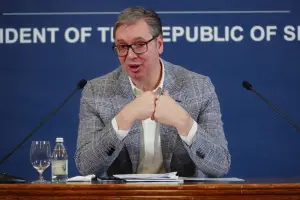 Belgrade, 4 January 2026
Belgrade, 4 January 2026Violation of UN Charter has become dominant principle of contemporary politics
-
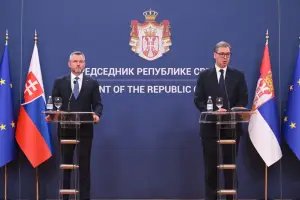 Belgrade, 21 December 2025
Belgrade, 21 December 2025Strengthening cooperation with Slovakia in many areas
-
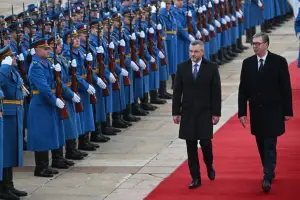 Belgrade, 21 December 2025
Belgrade, 21 December 2025President of Slovakia ceremonially welcomed in front of Palace of Serbia
-
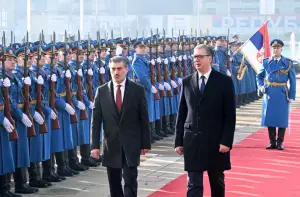 Belgrade, 18 December 2025
Belgrade, 18 December 2025Vučić welcomes President of Georgia in front of Palace of Serbia
-
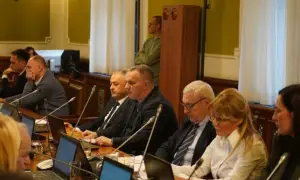 Belgrade, 15 December 2025
Belgrade, 15 December 2025Serbia needs strong, stable education system
-
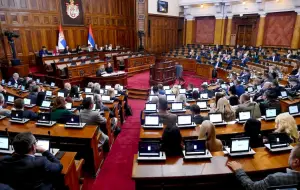 Belgrade, 3 December 2025
Belgrade, 3 December 2025Parliament adopts 2026 budget
-
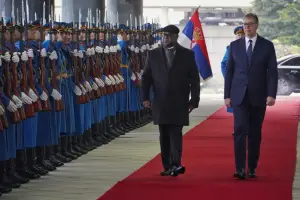 Belgrade, 28 November 2025
Belgrade, 28 November 2025Serbian President welcomes President of DR Congo
-
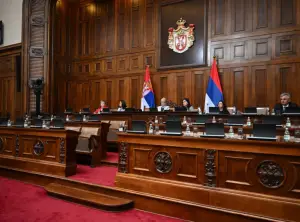 Belgrade, 7 November 2025
Belgrade, 7 November 2025Parliament adopts multiple laws
-
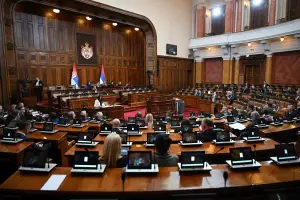 Belgrade, 22 October 2025
Belgrade, 22 October 2025Parliament adopts several laws, ratifies multiple international agreements
-
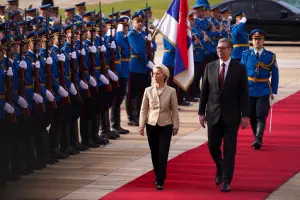 Belgrade, 15 October 2025
Belgrade, 15 October 2025Vučić welcomes Ursula von der Leyen in front of Palace of Serbia
